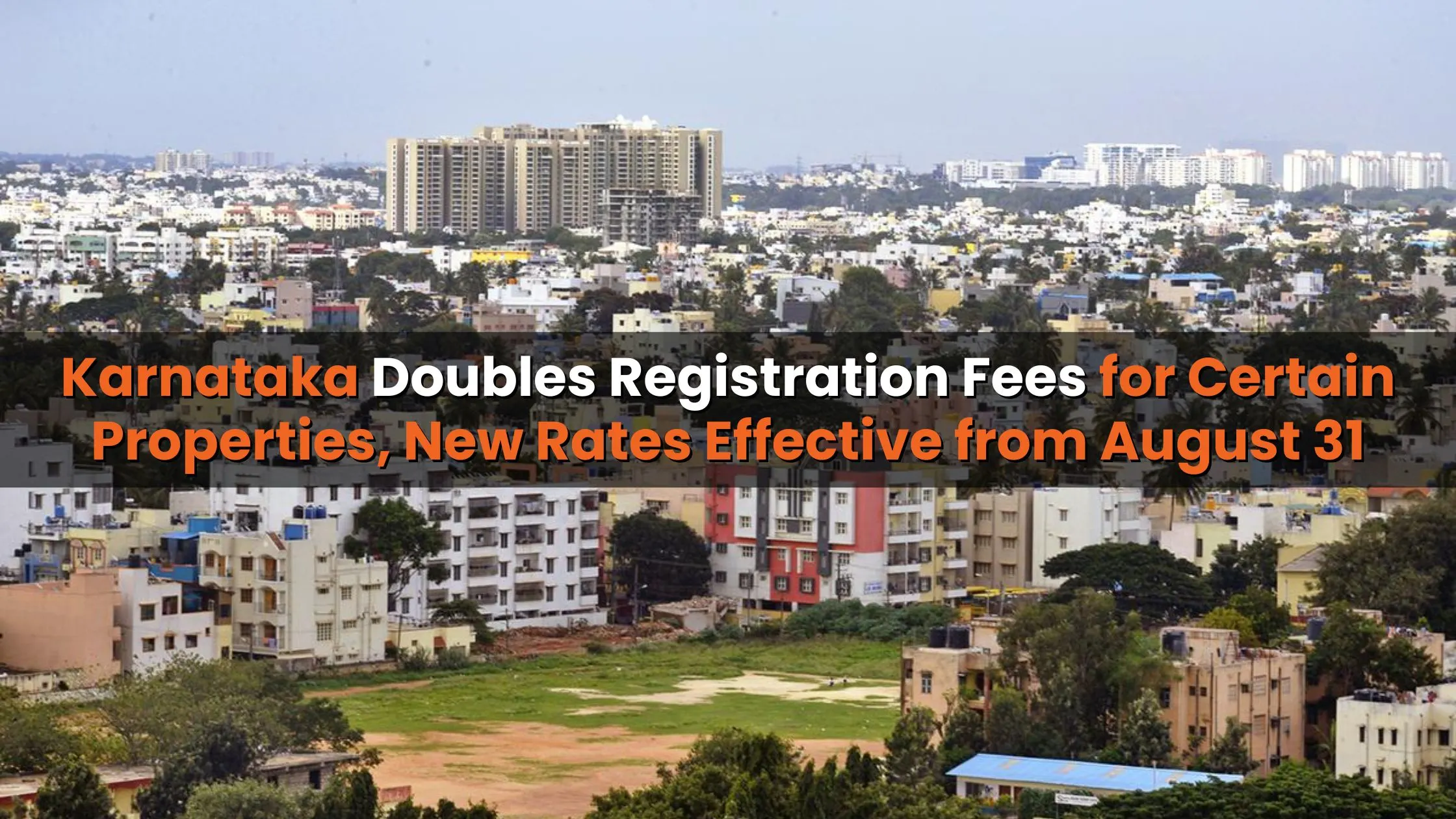Table of Content
▲
The Karnataka government has announced a major change in property transaction costs by revising the charges under the Registration Act, 1908. Effective August 31, 2024, the state has doubled registration fees for certain properties and documents, impacting both buyers and sellers. The move, outlined in a notification from the Revenue Department, will have implications for property registrations across Karnataka. With this revision, the message is clear: Karnataka doubles registration fees to align costs with current market realities.
Background of the Fee Revision
The registration process in Karnataka is governed by the Registration Act of 1908, which prescribes fees for registering property and other legal documents. Until now, the standard charge was ₹10 for every ₹1,000 or part thereof. Under the new order, this has been increased to ₹20, effectively doubling the cost.
Additionally, categories where fees were earlier set at “one rupee” will now be charged “two rupees”. The directive was issued by S. R. Shivashankar, Deputy Secretary to Government, Revenue Department (Disaster Management, Stamps and Registration), marking a clear shift in how property transactions will be taxed in the state.
Details of the New Fee Structure
The revised structure means:
- For every ₹1,000 (or part thereof) in a property or document transaction, the registration fee will now be ₹20 instead of ₹10.
- Other categories, where a nominal fee of ₹1 was charged, will now require ₹2.
- The order applies uniformly across affected property registrations and related legal documents.
For instance, a property valued at ₹50 lakh will now attract ₹1 lakh in registration fees, compared to ₹50,000 earlier a substantial increase for homebuyers.
Impact on Property Buyers and Sellers
The immediate impact of this revision will be felt by property buyers, who must factor in higher registration costs while closing deals. For sellers, particularly developers, the higher costs may slow down certain transactions as buyers adjust to the increased burden.
- Homebuyers: Those planning to register property after Aug 31 will see higher costs.
- Developers & Builders: The additional expense could influence sales cycles, especially in the affordable housing segment.
- Investors: Rising transaction costs may make short-term property flipping less attractive.
Despite these challenges, the demand in key urban centers like Bengaluru is likely to remain strong due to sustained IT-sector growth and housing demand.
Government’s Objective Behind the Move
The decision to double registration fees appears to be driven by two main objectives:
- Boosting State Revenue: Karnataka relies heavily on stamp duty and registration for revenue. The revised fees will increase government earnings significantly.
- Aligning with Market Trends: Property values in Karnataka, especially in Bengaluru, have surged over the past decade. Revising registration fees ensures that costs are proportionate to current property valuations.
Compared with several other states, Karnataka’s earlier registration fees were relatively modest. This revision brings them closer to prevailing national standards.
Reactions and Next Steps
The move has sparked mixed reactions:
- Property Buyers: Many buyers rushed to complete registrations before the August 31 deadline to avoid higher costs.
- Real Estate Developers: Industry stakeholders acknowledge the revenue need but express concern that the increase may impact affordability.
- Market Analysts: Experts believe the long-term effect will be minimal, as property demand in Karnataka—especially Bengaluru—remains robust.
For those planning new purchases, it’s important to factor in the doubled registration fees while budgeting for upcoming transactions.
Conclusion
The Karnataka government’s decision to revise registration fees is a landmark move with immediate financial implications for property buyers and investors. From August 31, the charges will double from ₹10 to ₹20 per ₹1,000, while smaller categories will also see their fees increase.
The bottom line: Karnataka doubles registration fees to reflect growing property values and strengthen state revenue collections. While this may raise upfront costs for buyers, the state’s real estate sector driven by IT hubs, infrastructure growth, and investor demand, is expected to remain resilient in the long run.






_1771582392.webp)
_1771577585.webp)
Ans 1. Effective August 31, 2024, the Karnataka government has doubled registration fees for certain property transactions and legal documents. The standard fee has increased from ₹10 per ₹1,000 to ₹20 per ₹1,000. Categories previously charged at ₹1 will now require ₹2.
Ans 2. The revised fees apply to all property registrations and related legal documents falling under the Registration Act, 1908, where the previous rates were ₹10 per ₹1,000 or ₹1 for specific categories.
Ans 3. Homebuyers will face higher registration costs when completing transactions. For example, a property valued at ₹50 lakh will now incur ₹1 lakh in registration fees instead of ₹50,000, meaning buyers must budget for higher upfront expenses.
Ans 4. Developers may experience slower sales cycles, especially in the affordable housing segment, as buyers adjust to the increased cost. However, demand in urban centers like Bengaluru is expected to remain strong due to IT-sector growth and housing needs.
Ans 5. The revision aims to boost state revenue from stamp duty and registration charges and align fees with current property market values, which have significantly increased over the past decade.
Ans 6. Many buyers rushed to register properties before the August 31 deadline to avoid higher fees. Developers acknowledge the revenue rationale but are concerned about affordability impacts. Analysts believe long-term property demand will remain resilient.
Ans 7. The fee increase applies uniformly to affected property transactions, with standard fees doubling from ₹10 to ₹20 per ₹1,000 and nominal categories increasing from ₹1 to ₹2.
Ans 8. Buyers should factor in the higher registration fees while budgeting and plan accordingly. It may be beneficial to complete pending transactions before August 31 to avoid paying the increased fees.